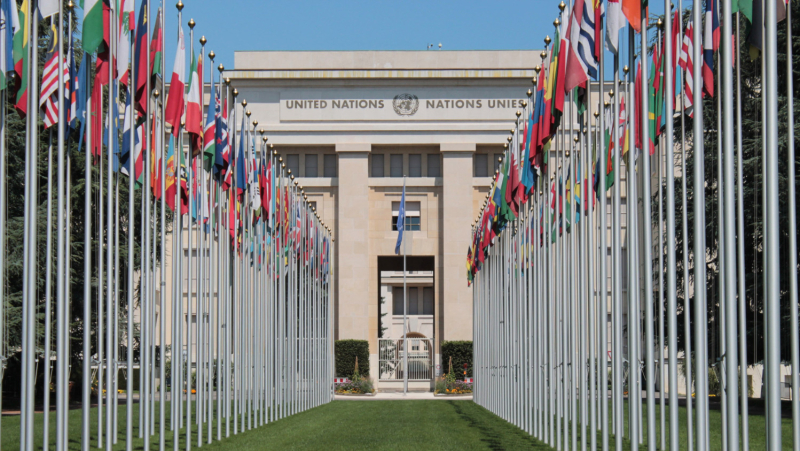The UN Forum on Business and Human Rights 2024: our reflections and key takeaways
Intern Banks and Human Rights campaign
lucilla@banktrack.org

Intern Banks and Human Rights campaign
lucilla@banktrack.org
BankTrack attended the 13th UN Forum in Geneva at the end of November, which included several sessions exploring the role of the financial sector, including banks, in advancing respect for human rights.
During the Forum, BankTrack launched the 5th edition of its Global Human Rights Benchmark, which found that the world’s largest banks still largely fail to implement their human rights responsibilities, particularly regarding addressing harms, protecting vulnerable groups and providing remedy.
In this piece, we explore key themes from the Forum’s discussions, examining how they were addressed in the context of the role of banks and the broader financial sector in achieving better outcomes for people and the planet.
1. Multi-stakeholder engagement and Free Prior Informed Consent are necessary for a just transition
A dedicated panel explored a “smart mix of measures to leverage the contribution of financial actors to a just transition”. Following COP29, it is clearer than ever that achieving a just transition requires adequate and effective financing for real solutions, placing financial institutions in a critical position.
While bank finance for initiatives aligned with climate and nature goals is fundamental, a transition that disregards the well-being of affected communities and people along banks’ supply chains perpetuates the very crisis it seeks to address. The panel highlighted the opportunity of investing in community-led just transition projects, which prevent human rights harm and help create safe spaces for engagement.
The Forum made clear that banks must conduct thorough human rights due diligence (HRDD) that includes multi-stakeholder partnerships with communities and Indigenous people. Panellists from CSOs highlighted the need to adopt Free, Prior, and Informed Consent in a non-tokenistic manner, ensuring it is independently verified. Our Human Rights Benchmark also shows significant gaps in bank practice, both regarding consultation with rights-holders and regarding FPIC.
2. The need for mandatory HRDD to avoid a compliance mindset
The session on “Advancing human rights due diligence in the financial sector” emphasised the need for financial institutions to adopt a human-right-based approach aligned with the UN Guiding Principles (UNGPs). However, a critical concern raised was that implementing the UNGPs should avoid fostering a compliance mindset. A key challenge, as highlighted by NGOs, lies in financial institutions’ reliance on non-regulatory ESG frameworks, which often lack clear definitions and even fail to account for human rights impacts. This has led to opaque and misleading ESG ratings, contributing to “human-rights-washing” instead of addressing risks to people, as noted by the OHCHR. One opportunity to address this is for the forthcoming 2026 revision of the Corporate Sustainability Due Diligence Directive (CSDDD) to explicitly include financial institutions to address existing accountability gaps.
3. Grievance mechanisms should be designed with rights-holder input
While panellists noted some progress in banks adopting rights-based approaches, ensuring access to remedies for affected rights-holders remains a neglected issue. Our benchmark results confirm this, with only seven banks out of 50 assessed having developed grievance mechanisms for people affected by their finance, which meet minimal standards.
In the session on financial actors and a just transition, a Filipino Indigenous representative urged FIs to design grievance mechanisms based on impacted communities’ dispute resolution practices, ensuring they are culturally sensitive, equitable, and gender-responsive.
4. Heightened HRDD in conflict situations is critical
During the Forum, BankTrack joined two side events addressing the role of financial institutions in conflict-affected areas. The first, “Corporate Accountability for International Crimes and the Right to Remedy”, co-organised by Pax and Swedwatch, focused on the role of businesses in the oil war in South Sudan. The second marked the launch of the annual Don’t Buy Into Occupation report, organised by the DBIO Coalition, of which BankTrack is a member. This report highlights the involvement of European financial institutions with illegal Israeli settlements in the Occupied Palestinian Territory. Both events highlighted the duty of FIs exposed to conflict-affected areas to undertake independently verified “heightened HRDD” to collect reliable insights on the human rights situation on the ground and respond appropriately. FIs should not hide behind claims of a “lack of information” but should work to bridge those gaps.
Panellists presented cases in which major financial institutions have increased their investments in clients, causing or contributing to adverse impacts despite readily available information. This failure to adopt a rights-based approach exposes banks to significant risks, including facilitation of grave human rights abuses, violations of international humanitarian law, and complicity in war crimes. For severe impacts, or where mitigation is not feasible, divestment may be necessary in line with the principle of responsible disengagement outlined in the OECD Guidelines.
Finally, financial institutions must fulfil their responsibility to respect human rights by ensuring those affected receive timely and adequate remedies. Failure to provide such remedies can result in formal complaints, such as the case brought to the Norwegian OECD National Contact Points concerning FIs in South Sudan.
To align with international standards, banks must move beyond a narrow focus on financial materiality and instead embed impact materiality at their core. This entails assessing how their operations affect people and the planet, with respect for human rights as a fundamental priority.
